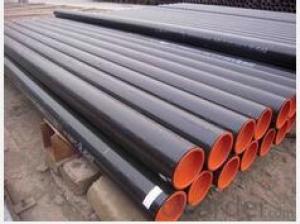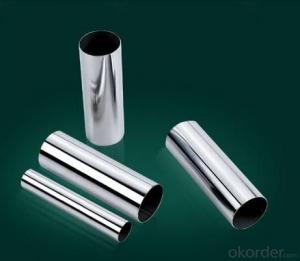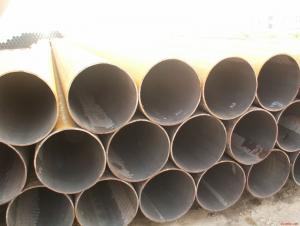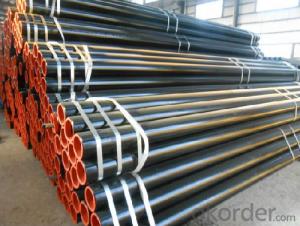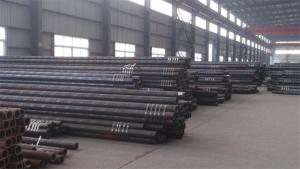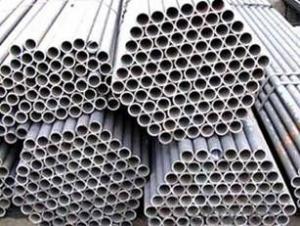Seamless steel tubes for petroleum cracking
- Loading Port:
- China Main Port
- Payment Terms:
- TT OR LC
- Min Order Qty:
- -
- Supply Capability:
- -
OKorder Service Pledge
OKorder Financial Service
You Might Also Like
Seamless steel tubes for petroleum cracking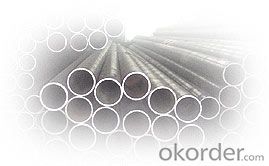
Standard:
GB9948 Chinese national standard
Application:
Served as for furnace tubes,heat exchange tubes and pipelines in petroleum and refinery plants
Model No.of major steel tubes:
1n 9n 1Er!rMn 1rhMn 1f:hM0 etC
Diamensional tolerances:
Types of steel tubes | Outer diameter | Wall thickness | ||
Cold-rolled tubes | Tube sizes(mm) | Tolerances(mm) | Tube sizes (mm) | Tolerances(mm) |
>30~50 | ±0.3 | ≤30 | ±10% | |
>50~219 | ±0.8% | |||
Hot-rolled tubes | >219 | ±1.0% | >20 | ±10% |
Mechanical properties:
Standard codes | Models of steel tubes | 抗拉强度(MPa) | 屈服强度(MPa) | 伸长率(%) | 冲击功(J) | 布氏硬度(HB) | 交货状态 |
GB9948 | 10 | 330~490 | ≥205 | ≥24 | / | / | 正火 |
20 | 410~550 | ≥245 | ≥21 | ≥39 | / | 正火 | |
15CrMo | 440~640 | ≥235 | ≥21 | ≥47 | ≤170 | 正火加回火 | |
1Cr2Mo | ≥390 | ≥175 | ≥22 | ≥92 | ≤179 | 正火加回火 | |
1Cr5Mo | ≥390 | ≥195 | ≥22 | ≥92 | ≤187 | 退火 |
Chemical composition:
Standard codes | Models of steel tubes | Chemical compositions(%) | |||||||
C | Si | Mn | P | S | Cr | Mo | Ni | ||
GB9948 | 10 | 0.07~0.14 | 0.17~0.37 | 0.35~0.65 | ≤0.035 | ≤0.035 | ≤0.15 | / | ≤0.25 |
20 | 0.17~0.24 | 0.17~0.37 | 0.35~0.65 | ≤0.035 | ≤0.035 | ≤0.25 | / | ≤0.25 | |
15CrMo | 0.12~0.18 | 0.17~0.37 | 0.40~0.70 | ≤0.035 | ≤0.035 | 0.80~1.10 | 0.40~0.55 | ≤0.30 | |
1Cr2Mo | ≤0.15 | 0.50~1.00 | 0.30~0.60 | ≤0.035 | ≤0.030 | 2.15~2.85 | 0.45~0.65 | / | |
1Cr5Mo | ≤0.15 | ≤0.50 | ≤0.60 | ≤0.035 | ≤0.030 | 4.00~6.00 | 0.45~0.60 | ≤0.60 | |
- Q: What are the different methods of pipe cutting for steel pipes?
- There exists a variety of techniques for cutting steel pipes, each tailored to specific circumstances and demands. Some of the most prevalent techniques are as follows: 1. Manual Pipe Cutters: These handheld tools are frequently employed for cutting smaller steel pipes. They typically feature a rotating cutting wheel that gradually creates a groove until the pipe is severed. Portable and relatively user-friendly, manual pipe cutters are suitable for on-site cutting tasks. 2. Hacksaw: The use of a hacksaw is a traditional and cost-effective means of cutting steel pipes. This method requires physical exertion and time; however, it can effectively cut pipes with smaller diameters. It is crucial to use a fine-toothed blade and apply steady pressure to ensure a clean and precise cut. 3. Reciprocating Saw: Also known as a sawzall, the reciprocating saw is a power tool that employs a back-and-forth cutting motion to swiftly and efficiently cut through steel pipes. These versatile saws can accommodate different types of blades to handle various pipe sizes and thicknesses. 4. Band Saw: Band saws are commonly employed in industrial settings for the purpose of cutting large steel pipes. These saws feature a continuous loop of teethed metal blade that moves on wheels, enabling precise and rapid cutting. Band saws are ideal for cutting large-diameter pipes and can be operated manually or fully automated for high-volume cutting tasks. 5. Pipe Cutting Machines: Pipe cutting machines are often utilized to achieve precise and consistent cuts. These machines are designed to cut steel pipes swiftly and accurately, making them suitable for large-scale industrial applications. Depending on the machine and requirements, various cutting methods like abrasive cutting, flame cutting, or plasma cutting can be employed. It is important to note that the selection of a pipe cutting method depends on factors such as pipe diameter, thickness, location, precision requirements, and available resources. It is imperative to adhere to proper safety precautions when working with any cutting method to prevent injury or damage to the pipes.
- Q: How are steel pipes used in the agricultural irrigation systems?
- Due to their strength and durability, steel pipes are widely used in agricultural irrigation systems. These pipes effectively transport water from a well or reservoir to the fields where crops are cultivated. One major advantage of using steel pipes in such systems is their ability to withstand high pressure and heavy loads, making them suitable for the transportation of large volumes of water over long distances without the risk of bursting or breaking. Additionally, steel pipes exhibit a high resistance to corrosion, which is crucial in agricultural settings where they may come into contact with fertilizers or other chemicals. Aside from their durability, steel pipes offer a smooth interior surface that minimizes friction and ensures a consistent water flow. This is essential in irrigation systems as it guarantees even water distribution across the fields, promoting optimal crop growth. Moreover, steel pipes can be easily connected and configured to meet the specific layout and requirements of the irrigation system. In summary, steel pipes play a crucial role in agricultural irrigation systems by facilitating the efficient and reliable transportation of water to crops. Their strength, durability, resistance to corrosion, and smooth interior surface make them an ideal choice for these applications.
- Q: How do you transport steel pipes safely?
- Steel pipes can be transported safely by properly securing them using appropriate restraints, such as straps or chains, to prevent shifting or movement during transit. Additionally, using suitable equipment and vehicles, such as flatbed trucks or trailers, with adequate support and cushioning, can help ensure the safe transportation of steel pipes. Regular inspections of the securing arrangements and adherence to relevant safety regulations are also crucial to maintain the safe transport of steel pipes.
- Q: How are steel pipes used in irrigation systems?
- Steel pipes are commonly used in irrigation systems to transport water from a water source, such as a well or a reservoir, to the fields or plants that need to be irrigated. These pipes are durable, strong, and resistant to corrosion, making them ideal for withstanding the constant flow of water and the harsh outdoor conditions. They are typically laid underground or above the surface, depending on the specific irrigation system design, and are connected to sprinklers or drip irrigation systems to distribute water efficiently and effectively to the crops or plants.
- Q: How are steel pipes protected against UV radiation?
- Steel pipes are typically protected against UV radiation through the application of specialized coatings or paints that contain UV inhibitors. These coatings form a barrier between the steel surface and the sun's UV rays, preventing degradation, discoloration, and potential structural damage caused by prolonged exposure to UV radiation.
- Q: How are steel pipes used in the manufacturing of chemical storage tanks?
- Steel pipes are commonly used in the manufacturing of chemical storage tanks as they provide structural support and serve as conduits for the transportation of chemicals. These pipes are typically used for connecting various components of the tank, such as the inlet and outlet valves, as well as for creating the internal plumbing system. The durability and corrosion resistance of steel make it an ideal material for ensuring the integrity and longevity of chemical storage tanks.
- Q: Are steel pipes suitable for HVAC systems?
- Yes, steel pipes are suitable for HVAC systems. Steel pipes have several advantages that make them a popular choice for HVAC applications. First, steel pipes are strong and durable, allowing them to withstand high pressure and temperature requirements commonly found in HVAC systems. Additionally, steel pipes have excellent corrosion resistance, making them suitable for both indoor and outdoor installations. Steel pipes also have a long lifespan, reducing the need for frequent replacements or repairs. Moreover, steel pipes are readily available in various sizes and thicknesses, allowing for easy customization and installation. Lastly, steel pipes are cost-effective, providing a cost-efficient solution for HVAC systems compared to other materials. Overall, steel pipes are a reliable and suitable choice for HVAC systems due to their strength, durability, corrosion resistance, availability, and cost-effectiveness.
- Q: What's the gate number of the precision steel pipe?
- Precision steel pipe refers to the high precision steel pipe, the wall thickness and internal and external diameter can be controlled within 10 wire tolerance range
- Q: How are steel pipes used in the renewable energy sector?
- Steel pipes are commonly used in the renewable energy sector for various purposes. They are used in the construction of wind turbine towers, providing support and stability to the turbines. Steel pipes are also used in the transportation of natural gas, which is considered a cleaner alternative to fossil fuels. Moreover, steel pipes are used in the construction of solar power plants, where they are utilized for the distribution of water and other fluids necessary for the cooling systems. Overall, steel pipes play a crucial role in the renewable energy sector, contributing to the development and efficiency of sustainable energy sources.
- Q: Is there any difference between HFW steel pipe and ERW steel pipe?
- The difference between ERW (longitudinal resistance welding) and HFW (high frequency welding) is mainly due to the different principle.
Send your message to us
Seamless steel tubes for petroleum cracking
- Loading Port:
- China Main Port
- Payment Terms:
- TT OR LC
- Min Order Qty:
- -
- Supply Capability:
- -
OKorder Service Pledge
OKorder Financial Service
Similar products
Hot products
Hot Searches
Related keywords
